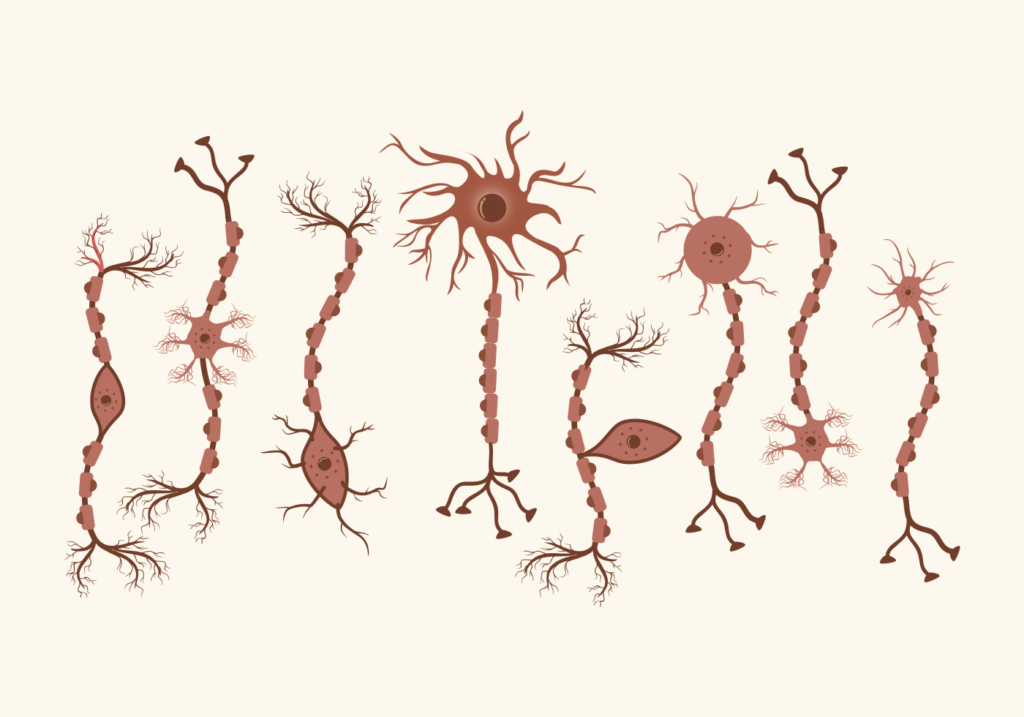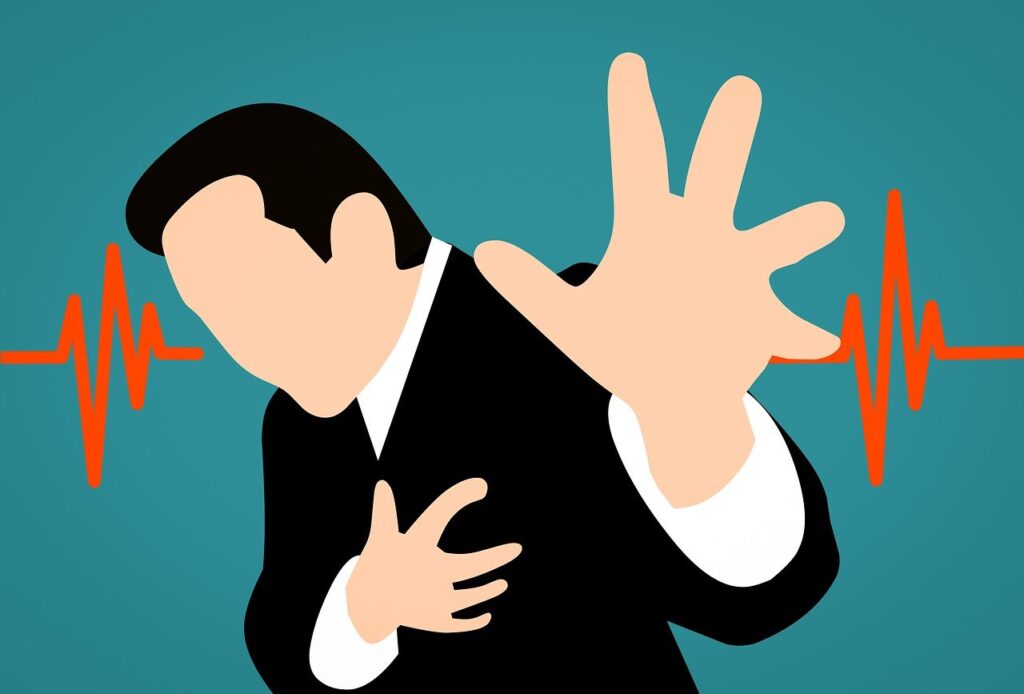Pinched nerves in the chest can bring about an alarming pinched chest pain, and when you suspect that you are suffering from it, it’s only natural for you to have questions and concerns. Let me explore everything you need to know about pinched nerves in your chest. This includes their causes, symptoms, and possible remedies.
What is a Pinched Nerve in the Chest?
A pinched nerve in your chest occurs when excessive pressure or compression affects a nerve within your chest. In the chest, this can lead to various symptoms, including pinched nerve chest pain, tingling, and great discomfort.
Trapped Nerve in the Chest
A trapped nerve in the chest occurs when a nerve in your thoracic region becomes compressed. The definition is the same with a pinched nerve which leads you to experience trapped nerve chest pain or simply pinched nerve chest pain as we have seen from the definition of a pinched nerve. Some symptoms will include sharp or radiating chest pain, tingling sensations, or numbness in your chest area.
It’s essential for you to differentiate this discomfort from potential cardiac issues, as chest pain can also be a symptom of heart-related problems. You need to seek medical attention for an accurate diagnosis and appropriate treatment. This may involve physical therapy, pain management, or lifestyle adjustments to alleviate the pressure on the affected nerve.
Causes of Pinched Nerves in the Chest
Pinched nerves in your chest can occur due to a variety of triggers, these include:
- Poor Posture: Slouching or maintaining improper posture can exert pressure on your nerves.
- Muscle Imbalance: Imbalances in the chest muscles can cause pressure on your nerves.
- Injury or Trauma: Accidents or injuries may lead you to have pinched nerves in your chest.
- Degenerative Changes: Conditions like having herniated discs in your chest can contribute to pinched nerves in your chest.
- Repetitive Movements: Repetitive activities can strain your chest area and lead to nerve compression.
Common Symptoms of Pinched Nerves in the Chest
When a nerve in your chest is pinched, it can bring about various symptoms, such as:
- Chest Pain: This is the most common symptom of a pinched nerve in the chest.
- Tingling or Numbness: You may experience tingling or numbness radiating to the arms.
- Muscle Weakness: Weakness in the chest and arm muscles can also occur.
- Burning Sensation: Some individuals report a burning sensation in the chest.
Pinched Nerve in the Chest: Left Side Symptoms
A pinched nerve on the left-hand side of your chest can manifest symptoms similar to those mentioned above. These symptoms can be particularly alarming, as they may be confused with cardiac issues.
Diagnosis and Medical Evaluation
When you experience pinched nerves in the chest pain or suspect that you have a pinched nerve, you need to seek medical evaluation. Your healthcare provider will conduct a thorough examination and may recommend diagnostic tests to rule out cardiac issues or other conditions.
Treatment and Remedies for Pinched Nerves in the Chest
The treatment approach for pinched nerves in the chest will include:
- Rest: Reducing activities that exacerbate your symptoms.
- Physical Therapy: Targeted exercises can help you to alleviate the pinched chest pain and improve your posture.
- Pain Medication: Over-the-counter or prescription medications that may be recommended by your physician.
- Heat or Cold Therapy: Applying heat or cold packs can greatly relieve you.
- Ergonomic Adjustments: Modifying your workspace or daily activities to maintain proper posture.
- Injections: Corticosteroid injections can help reduce inflammation in the area around the pinched nerves in the chest.
- Surgery: In severe cases, careful surgery may be necessary for you to relieve pressure on the chest nerve.
Preventing Pinched Nerves in the Chest
Preventive measures can reduce the risk of developing a pinched nerve in your chest. Proper posture, regular exercise, and ergonomic adjustments in your daily life can help you prevent any problems associated with pinched nerves in your chest.
When Should You Seek Immediate Medical Attention?
It’s important for you to note that if you experience severe chest pain, shortness of breath, or other alarming symptoms, you should seek immediate medical attention. These symptoms may indicate a medical emergency.
Moving Towards a Pain-Free Chest
Pinched nerves in your chest can be painful and disruptive. However, with the right medical guidance, lifestyle adjustments, and appropriate remedies, you can work towards a pain-free chest and improved quality of life. If you’re experiencing symptoms, you must consult your healthcare professional to determine the cause and receive appropriate treatment.
Chest Pinched Nerve on the Left Side
A chest-pinched nerve on the left side refers to compression or pressure on a nerve in the left area of the chest. This leads to symptoms such as pain, numbness, or tingling on the left-hand side of your chest. This condition can be caused by factors like muscle strain, herniated discs, poor posture, or injury. It is essential for you to consult your healthcare professional for an accurate diagnosis and appropriate treatment, especially considering the potential seriousness of chest pain, which may be associated with cardiac issues.
What are the Pinched Nerve Thoracic Spine Symptoms?
Pinched nerve symptoms in the thoracic spine typically include localized pain, numbness, or tingling in the mid-back region. These symptoms are collectively called pinched thoracic nerve chest pain. Since the thoracic spine is the upper and middle part of your back, symptoms may manifest along your ribs and chest. If you have a pinched nerve in your thoracic spine, you might also experience discomfort that radiates to your arms or abdomen.
Depending on the severity and location of the compression, additional symptoms such as muscle weakness or changes in reflexes could occur in you. It is very important for you to seek medical evaluation for a proper diagnosis and to determine an appropriate course of treatment based on the specific symptoms and underlying cause.
What is the Pinched Nerve Causing Chest and Back Pain?
A pinched nerve causing chest and back pain refers to the compression or irritation of a nerve in your spine, potentially in your thoracic region. This compression can lead you to feel pain or discomfort in your chest and back, often accompanied by symptoms like numbness, tingling, or radiating pain.
Causes of a pinched chest nerve in this area may include muscle strain, herniated discs, poor posture, or injury. It is very important to consult with your healthcare professional to determine the exact cause, rule out more serious conditions, and receive appropriate treatment tailored to the specific symptoms and underlying issues.
What is the Pinched Nerve Thoracic Spine MRI?
A pinched nerve thoracic spine MRI is a medical imaging procedure that utilizes magnetic resonance technology to capture detailed images of the thoracic spine. This diagnostic tool helps your healthcare professionals visualize your structures, discs, and nerves in the mid-back region, identifying any compression, inflammation, or abnormalities that might be causing symptoms like pain, numbness, or tingling. An MRI provides valuable information for an accurate diagnosis, allowing your healthcare providers to determine the extent of nerve compression and formulate an appropriate treatment plan for you based on their specific findings.
What are the Pinched c4 Nerve Symptoms?
Pinched C4 nerve symptoms typically involve pain that radiates from your neck down to the shoulder and may extend into your upper arm. The C4 nerve, originating from the cervical spine, plays a role in sensation and motor function in your neck and upper shoulder region. Compression or irritation of this nerve, often caused by conditions like herniated discs or cervical stenosis, can result in you having localized discomfort, muscle weakness, and altered reflexes.
Pinched Nerve in Chest Left Side Treatment
The treatment for a pinched nerve in the left side of the chest involves addressing the underlying cause of nerve compression. Conservative approaches do include rest, avoiding activities that exacerbate symptoms, and the use of over-the-counter pain relievers. Physical therapy can be beneficial for improving your posture, strengthening your muscles, and reducing pressure on the affected nerve. In some cases, medications like anti-inflammatory drugs or muscle relaxants may be prescribed.
Severe or persistent cases might require you to have more advanced interventions, such as corticosteroid injections or, rarely, surgical procedures to alleviate pressure on the pinched nerve. It’s essential for you to consult with your healthcare professional for an accurate diagnosis and to determine the most appropriate treatment plan based on the specific circumstances.
Pinched Nerve Thoracic Outlet Syndrome
Thoracic Outlet Syndrome (TOS) is a condition involving compression of your nerves, veins, or arteries in the thoracic outlet, a space between the collarbone and the first rib. A pinched nerve in Thoracic Outlet Syndrome can cause symptoms such as pain, numbness, and tingling in the neck, shoulder, and down the arm, often exacerbated by certain arm positions.
TOS can result from factors like poor posture, trauma, or anatomical variations. Treatment may involve physical therapy to improve posture and muscle strength, pain management, and, in some cases, surgical intervention to alleviate compression. Seeking medical advice is crucial for an accurate diagnosis and tailored treatment plan for Thoracic Outlet Syndrome.
Discover www.medicalantidote.com for additional health insights.



